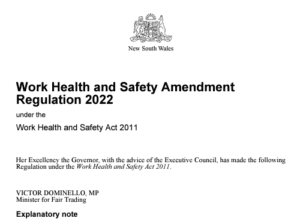Psychosocial Hazards: New WHS Regulations in NSW
 New legislation has come into effect in NSW with the introduction of the Work Health and Safety Amendment Regulations 2022. This addition to the existing regulations provides extra guidance on the definition and management of psychosocial hazards in the workplace.
New legislation has come into effect in NSW with the introduction of the Work Health and Safety Amendment Regulations 2022. This addition to the existing regulations provides extra guidance on the definition and management of psychosocial hazards in the workplace.
There are no additional legal duties placed on the employer as the employer’s primary duty of care has always included the duty to ensure the mental well-being of staff, however, the new regulations provide some specific details on how this duty of care should be met.
Our article on the mental health duty of care that employers owe their employees in regard to psychosocial hazards provides some information on how businesses can manage this risk. The new WHS Regulations state the employer must consider the following in the management of psychosocial hazards in the workplace:
- the duration, frequency and severity of the exposure of workers and other persons to the psychosocial hazards, and how the psychosocial hazards may interact or combine, and
- the design of work, including job demands and tasks, and
- the systems of work, including how work is managed, organized and supported, and
- the design and layout, and environmental conditions, of the workplace, including the provision of—
- safe means of entering and exiting the workplace, and
- facilities for the welfare of workers, and
- the design and layout, and environmental conditions, of workers’ accommodation, and
- the plant, substances, and structures at the workplace, and
- workplace interactions or behaviors, and
- the information, training, instruction, and supervision provided to workers.
Click here to access a copy of the new WHS Regulations.
These regulations provide more context and guidance on the management of psychosocial hazards and are provided in addition to the Code of Practice: Managing psychosocial hazards at work, which came into effect May 2021.
